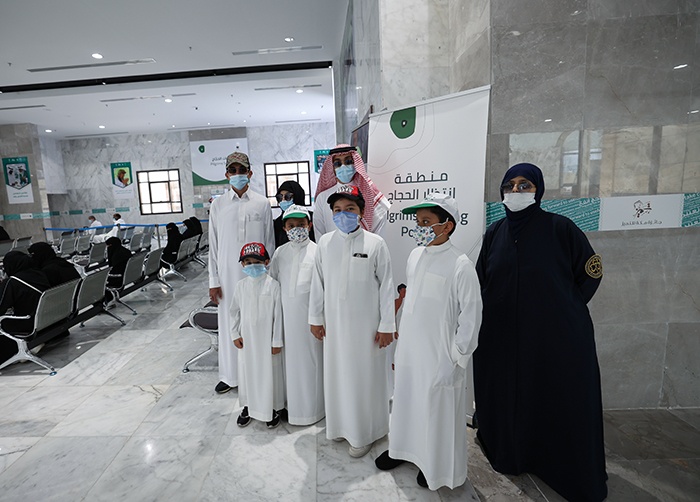MAKKAH: In Makkah, the site of the annual hajj, the sons of a prominent Saudi guide who died of COVID after three decades serving pilgrims have taken up the torch in tribute. Talaat Tounsi came from one of the six families in Makkah who traditionally serve as "mutawaf" – guides who help foreign pilgrims perform the rites of hajj and the year-round umrah.
A former sports journalist before devoting himself to the vocation, which is passed down from generation to generation, he died in August 2020 at the age of 52, leaving behind six sons and two daughters. "If something happens to me, you and your brothers will have to stay together and continue my work," Tounsi said before his death, according to one of his sons Majed.
"We all decided to work this year for the first time in the service of pilgrims to honour the memory of our father," the 32-year-old doctor told AFP, his voice shaking with emotion. The entire family fell ill in July 2020 after one of Tounsi's two daughters, who is also a doctor, became infected with the virus.
"He was admitted to the intensive care unit but went on to suffer from multiple complications. He fell into a coma and never recovered," Majed said of his father. The dean of the mutawaf, Abdullah Al-Maliki, said in a video that Tounsi had "physically left us, but with his good deeds and morals, he is still among us", commending his sons for continuing the tradition.
Saudi Arabia, which has recorded more than 500,000 coronavirus infections including some 8,000 deaths, has drastically limited the number of hajj pilgrims in the past two years due to the pandemic. From 2.5 million in 2019, the quota was slashed to about 10,000 the following year when the hajj was held just months after the pandemic broke out.
'Carrying on the mission'
Tounsi told AFP in an interview last year that he was "deeply saddened" at the prospect of holding such a limited pilgrimage. This year's hajj, which reaches its high point on Monday, takes in a total of 60,000 pilgrims – all vaccinated and either citizens or residents of the kingdom, with Muslims abroad excluded once again.
During Ramadan, the fasting month which this year spanned April and May, Majed and his brothers volunteered with associations in Makkah, Islam's holiest city. It is home to the Kaaba, a large black cubic structure at the center of Makkah's Grand Mosque.
The first ritual of the hajj consists in performing "tawaf" – the word from which mutawaf is derived – or walking seven times around the Kabaa. At the end of the pilgrimage, following the stoning ritual at Mount Arafat, pilgrims return to Makkah for a final circling of the Kaaba.
Tounsi's sons, some accompanied by their own sons, have been mobilized in Mecca the past few days to cater to the need of the pilgrims. While the youngest family members hand out hand out water, coffee and dates, the older ones help pilgrims complete administrative procedures, largely through contact-free technologies laid on by authorities to curb infections.
"I feel I am carrying on the mission and role of my father," Majed said, recalling days spent by his side during his childhood during the hajj and umrah.
'Honor given by God'
The Tounsi family has been working as hajj guides for more than 80 years. The baton is passed on through the generations within six families in Makkah whose members – both men and women – help with transportation, food, shopping, and visits to historical religious sites.
Talaat Tounsi was head of the pilgrimage services committee in Makkah before his untimely death. "Every year since we were little, we used to spend the days of the hajj in the holy places with my father," Jamal, another of his sons, told AFP. "He always told us that this job is an honor that God gave to the people of Makkah and that we should not abandon it," said the 23-year-old engineer. – AFP


